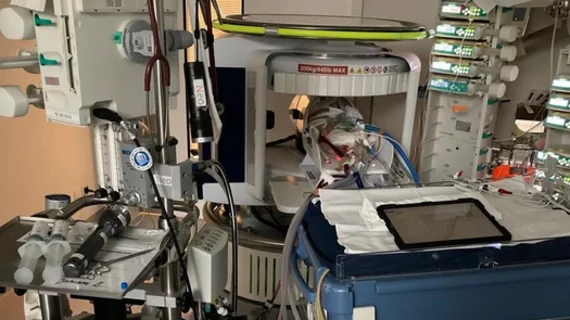Portable MRI achieves 'immense success' in study of critically ill children
Results from the world’s first study on the use of portable MRI equipment during pediatric ECMO therapy were published April 4 in Critical Care.
Extracorporeal membrane oxygenation (ECMO) procedures oxygenate blood from outside of the body, which requires specialized equipment. These patients are typically critically ill and are monitored via numerous pieces of medical equipment that are not easily transported for imaging necessary to monitor patients' responses to treatment. This is especially true in pediatric patients undergoing ECMO therapy, as access to patients’ blood usually occurs through the neck, making transportation a delicate and sometimes impossible process.
“Neuroimaging during modern intensive care medicine often remains a challenge. Especially in pediatric patients, easily accessible availability of high-quality brain imaging remains an often unbeatable hurdle,” corresponding author of the new paper Hemmen Sabir, from the Department of Neonatology and Pediatric Intensive Care at Bonn University Hospital (UKB) in Germany, and colleagues explained.
Sabir explained that there is a need to monitor certain brain structures during ECMO therapy, and that other imaging modalities, such as ultrasound and CT, have their own limitations and pitfalls. In recent years, low-field portable MRI equipment has emerged as a potential solution to such conundrums, but until recently its utility in bedside pediatric ECMO settings had not been tested.
A team at UKB was able to test the feasibility of portable MRI exams on four patients at the facility who were undergoing ECMO therapy. The patients ranged in age from a newborn baby to a 10-year-old child. Exams were successfully and safely completed on each child, with one being sent for immediate treatment after a large brain hemorrhage was identified on their imaging.
Prof. Andreas Müller, director of the Department of Neonatology at UKB, described the team’s work as an “immense success.”
"The new findings prove that the scan can be performed safely. We obtained meaningful MRI images of the brain without changing the position of the neck cannula and without compromising the children's safety status,” Müller said. “This represents an immense success for future MRI examinations of newborns and larger children who can only survive through the use of ECMO therapy.”
Since obtaining the portable MRI equipment via funding received from a grant from the Bill Gates Foundation, the hospital has utilized the machine in dozens of children. It has helped to identify numerous urgent findings, such as brain hemorrhages, strokes, acute accumulation of cerebrospinal fluid, etc. While experts maintain that conventional MRI still offers superior image quality, portable MRI is ideal for emergency diagnostics, they suggested.
The study is available to view here.

